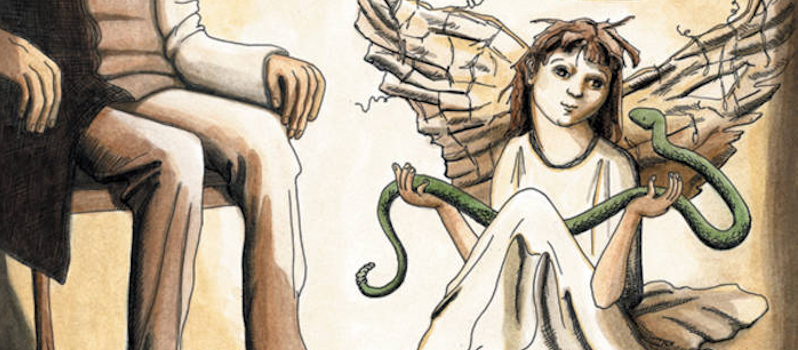There’s something almost inherently disjunctive and disjointed about contemporary music entirely cast in the mold of its “Old Timey” or roots-oriented predecessors. While some of these artifacts benefit from accompanying pseudo-historical narratives (think the wildly popular O Brother, Where Art Thou? soundtrack) and others play off the bizarre intersections of their source material with modern themes and modes of songwriting (Pinataland, Reclinerland, They Might Be Giants, et al.), many feel like so much nostalgia for nostalgia’s sake. Well, Curtis Eller — a folk-narrative banjo-picker from, of all places, the rough-and-tumble American frontier of New York City — doesn’t seem to see it that way at all. On his self-released Taking up Serpents Again, Eller and his American circus hammer out 10 folksy ballads, acoustic odes, and spirited country-western stompers that not only relish the historical anachronisms but shine light on the disconnect between “past” and “present,” somehow stressing in that divide the relative timelessness of the music.
The record, all 39 minutes or so of it, is a massive litany of cultural identifying points. Beyond the almost entirely pre-rock instruments themselves — banjo, accordion, upright bass, drums, tuba, and the occasional appearance of, yes, yodeling — we get Abraham Lincoln, Buster Keaton, Amelia Earhart, Charles Lindbergh and the Lindbergh baby, Fatty Arbuckle, Charlie Chaplin, Stephen Foster, allusions to the Civil War, and, strangely enough, multiple nods to Elvis.
The music — banjo-driven and resilient, vaguely bluegrass, vaguely box-car folk — recalls an American south or western frontier in the days before electricity, but the references Eller unwinds speak to some unidentifiable moment in history: some split second, suspended in space, when the nation was still young and naive and hopeful. It’s a strange but inviting sentiment and one which, credit to Eller and an attention to continuity here, lingers over almost all of the disc.
The songs are similarly tough to pin down. The album-opening title track has an eerie calm to it that can be downright breathtaking, the upright bass and rattlesnake maracas slithering behind a carefully plucked banjo, Eller’s sometimes-smoky lead pipes and the occasional backing of breathy female sirens. The results can be dead-on and chilling. The same could be said of “Sugar in My Coffin,” a more upbeat ho-down with accordion, pumping bass figures, and brushed traps. Or the murder ballad “Two of Us,” complete with a menacing bass backbone and flirtatious accordion that descends into restrained carnival bridges. But these tracks are surrounded by songs that are good but not always great — the somber ode “Buster Keaton,” which tends to wander despite its heart being in the right place, or some of the playful but overreaching enthusiasm of “Hide that Scar.” (The song’s pre-rockabilly bridges, all stomping bass, and rollicking vocals, should be separated for worthy praise.)
Eller closes the 10-song disc with “Stagecoach,” the most explicitly melancholy and bluesy offering on the disc. It’s also one of the most achingly romantic, direct and riveting. Over a simple but muted, borderline Fahey-esque banjo line, Eller sings to a distant love, “Hey / Hey, Mary / I never seen it snow / Like it did last night / I heard the runway icing over / Well I hope / You will forgive me / But I lied about the stagecoach / And I never / I never have been west / Of Chicago.” When Eller sings the word “lied,” it stretches, with a soreness that’s audible in the voice, for what feels like an endless run of measures: a heartfelt apology as much to Mary as to the listener, who Eller has spent more than a half-hour painting into non-existent historical corners. But the spirit of the song, the nakedness of it, illustrates the bigger truth that may be on display here. Eller might be a modern-day New Yorker as capable of plugging in a loud, distorted electric guitar as fretting away on an antique banjo, but the heart he lays down on magnetic tape is clearly what transcends the medium — and the contexts — in which he seeks to spin his tales. – Delusions of Adequacy, Jan. 5, 2006




